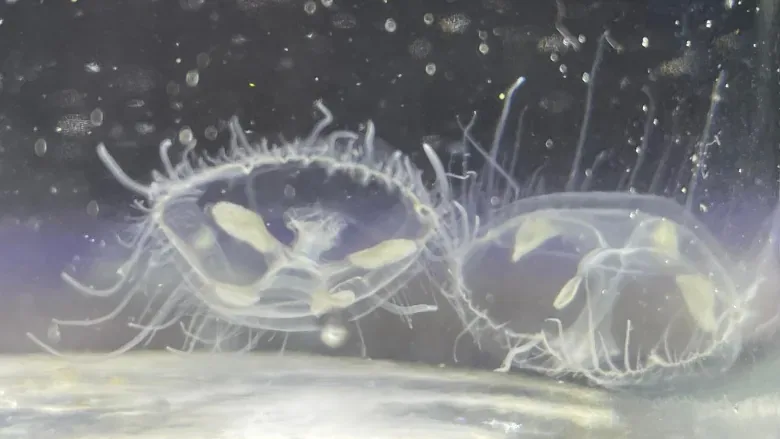
Sudbury, Ont., diver finds jellyfish in city's Ramsey Lake
A video shot by a Sudbury, Ont., diving instructor went viral after he recorded small jellyfish in Ramsey Lake, at the centre of the city.
Jason Fox has done hundreds of dives in the lake, over a 10-year period, and had never seen jellyfish, until recently.
Visit our Complete Guide to Fall 2022 for an in-depth look at the Fall Forecast, tips to plan for it and much more!
"We were actually just doing a fun dive on the 26th of August and my friend actually was the first one to spot the first one," he said.
Just over a week later, on Sunday, Sept. 4, another diving instructor was out with a group of students and spotted about eight jellyfish in the lake.
On Sept. 11 Fox returned to the lake and counted 22 jellyfish during his first dive.

Diving instructor Jason Fox discovered small jellyfish, called craspedacusta sowerbii, while out on a dive in Sudbury's Ramsey Lake. (Submitted by Jason Fox)
"And on the second dive, there was like probably 50 or more," Fox said.
"I just basically stopped counting. So yeah, we were kind of surprised to see them there. Been diving in that lake for a long time, and our instructor at the shop, he's been there for at least 20 years."
Fox said the jellyfish were around the size of a penny or dime.
"They won't sting humans because their tentacles are just so small that they won't sting, but for maybe smaller fish, they might sting the fish," he said.
Harmless to people
Charles Ramcharan, a professor emeritus of biology at Laurentian University, said the species of freshwater jellyfish is called craspedacusta sowerbii, and originates from the Yangtze basin in China.
"They came to North America a long, long time ago and also in Europe, and they've just spread all over the place," Ramcharan said.
He said people have spread them to different lakes from ballast water, mud from people's boots, or even boat hulls.
While the species isn't native to North America, Ramcharan said they are harmless to humans and the local ecosystem.

Charles Ramcharan, a biology professor emeritus at Laurentian University, says the freshwater jellyfish last bloomed in the Sudbury area in 2003. (Markus Schwabe/CBC)
"They have stinging cells, but they're not nearly powerful enough to harm anybody, so they're really pretty benign," he said.
The jellyfish have two life stages. When they are visibly floating in the water, that is called the manubrium.
"So this is the life stage that reproduces sexually," Ramcharan said.
"The other life stage is really strange. They reproduce vegetatively. So this is a life stage that is called a strobila."
Ramcharan said the jellyfish have been in the Sudbury region for decades, but they only bloom, and are visible to most people, on rare occasions.
"The last time they were here was in 2003, which is when I moved to Sudbury," he said.
He said no one understands what causes them to bloom. And they're only around for a couple of weeks.
"I would tell people to get out there, go swimming," Ramcharan said.
"I know it's cold, but just go swimming and go and see them. You know, people pay a fortune to go to the tropics to see jellyfish. And now they've come to you."
WATCH: Are jellyfish the new seafood? This is why they should be
The story was originally published for CBC News. It contains files from Ashishvangh Contractor.










